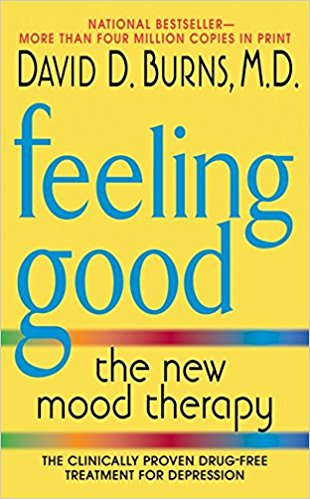Feeling Good Summary
6 min read ⌚
 The New Mood Therapy: The Clinically Proven Drug-Free Treatment for Depression
The New Mood Therapy: The Clinically Proven Drug-Free Treatment for Depression
If you suffer from some mild form of depression – or even anxiety, PTSD and substance abuse – “Feeling Good” can help you possibly even more than medications.
But even if you suffer from major depressive disorder, please read this book and use its suggestions in combination with your medications.
It does help.
Who Should Read “Feeling Good”? And Why?
According to the World Health Organization, 300 million people around the world suffer from depression. In more comprehensible terms, that is almost equal to the whole population of the United States, and it amounts to about 1 in every 25 people!
If you are one of them, “Feeling Good” is certainly a book that should be on your radar. It’s the book which basically introduced the world to cognitive-behavioral therapy (CBT), according to Wikipedia, “the most widely used evidence-based practice at improving mental health.”
Which means that Burns’ subtitle is not an exaggeration.
We certainly hope the same will prove true in your case as well.
About David D. Burns
 David D. Burns is an adjunct professor emeritus in the Department of Psychiatry and Behavioral Sciences at the Stanford University School of Medicine.
David D. Burns is an adjunct professor emeritus in the Department of Psychiatry and Behavioral Sciences at the Stanford University School of Medicine.
He is primarily known as the popularizer of Aaron T. Beck’s cognitive behavioral therapy through his “Feeling Good” bestselling series of books.
Burns is the recipient of numerous awards and honors.
“Feeling Good PDF Summary”
About half a century ago, David D. Burns received an M.D. from the Stanford University School of Medicine. Three years later, he went to the University of Pennsylvania to start his training as a psychiatric resident.
Fortunately for him, a guy named Aaron T. Beck, now regarded as “the father of cognitive therapy,” was doing his pioneering work in the field during these very years.
Contrary to what Freud and most psychoanalytic approaches taught at that time, Beck was all but certain that depression wasn’t an emotional state, but a cognitive problem.
He devised this theory by working closely with depressed people and realizing that most of them had actually a lot of friends and had managed to achieve a lot in life but were still stuck in an emotional prison which made them feel as “losers” and “loved-by-no-one” outcasts.
Now, how could that be? – Beck thought.
Or, to rephrase that, if an emotion is an uncontrollable natural reaction to an external event, then why are some people so unhappy even though, rationally examined, the events which trigger this unhappiness are, at worst, agreeable?
His answer: because thoughts predate – and, even more, create – feelings.
And that’s the first of the three principles of cognitive behavioral therapy:
#1. To formulate it once again, this time in the words of Burns, “all your moods are created by your ‘cognitions,’ or thoughts.”
#2. Consequently, depression is nothing more but the result of negative thinking, i.e., “when you are feeling depressed, your thoughts are dominated by a pervasive negativity.”
#3. Your negative thoughts function the same way the mirrors in amusement parks do: “negative thoughts which cause your emotional turmoil nearly always contain gross distortions.”
To sum up – no matter how naïve it may sound:
Every bad feeling you have is the result of your distorted negative thinking.
Now, since feelings, in turn, influence your thoughts, depression is actually the result of a wicked Catch-22: the worse you feel, the more grotesque and misleading your thoughts are, which creates even more depressing and dispiriting feelings.
Fortunately, there is a way out?
So, “what is the key to releasing yourself from your emotional prison?”
Simply this: Your thoughts create your emotions; therefore, your emotions cannot prove that your thoughts are accurate. Unpleasant feelings merely indicate that you are thinking something negative and believing it. Your emotions follow your thoughts just as surely as baby ducks follow their mother.
In simpler words, according to cognitive behavioral therapists, depression is not an emotional disorder, but a thinking problem.
And can be solved by challenging the suffering person’s negative thoughts, i.e., cognitive distortions.
Burns lists eleven of them:
#1. All-or-Nothing Thinking. Technically known as “dichotomous thinking,” all-or-nothing thinking is when you portray yourself in black-or-white terms. It’s obviously not true that it’s worthless if it’s not perfect.
#2. Overgeneralization. If something happened to you once, it doesn’t mean it will happen to you again. And even if it happened to you twice, the third time may be the charm!
#3. Mental Filter. Also known as “selective abstraction,” mental filtering means being unhappy because of that lost point on your exam even though you got an A. Really?!
#4. Disqualifying the Positive. Nothing good ever happens to you? How about the fact that your boyfriend kissed you lovingly this morning, or that you were promoted just a week ago! All of that matters!
#5. Jumping to Conclusions. This can come in at least two different forms: as mind-reading (“I know she doesn’t like me…”) or fortune telling (“I can feel something’s bad about to happen!”)
#6. Magnification. This is when you start worrying about your lifetime reputation because everyone saw you spilled your coffee on your shirt this morning. Also known as – somewhat unscientifically, but quite fittingly – “catastrophizing.”
#7. Minimization. Ah, the other side of the “binocular trick”: shrinking things until they become insignificant, be they other people’s imperfections or your own qualities.
#8. Emotional Reasoning. Your emotions are not true; if they were, then how would you explain the fact that you wanted to smack your sister on the head with a frying pan that time she invaded the privacy of your room? Consequently, if you feel like a dud, that doesn’t mean you are a dud.
#9. Should Statements. This is when you try to improperly motivate yourself by saying “I should do this” or “I must do this.”
#10. (Mis)Labeling. “Personal labeling,” writes Burns, “means creating a completely negative self-image based on your errors. Mislabeling involves describing an event with words that are inaccurate and emotionally heavily loaded.”
#11. Personalization. Personalization means assuming personal responsibility for an event contrary to the evidence. Burns calls this distortion “the mother of guilt.”
If you want to learn more about cognitive distortions, read here.
And then start doing something about them!
Key Lessons from “Feeling Good”
1. Your Feelings Are Actually Mirroring Your Thoughts
2. The Three Principles of Cognitive Behavioral Therapy
3. The Real Founder of CBT: Epictetus
Your Feelings Are Actually Mirroring Your Thoughts
Most people think that they should believe their gut.
In other words, that if their feelings tell them that something is true – this guy is bad, that girl is the love of my life – it is inevitably true.
The problem?
Feelings are not merely transitory, but they are also just a reflection of your thoughts.
Consequently, almost all of your bad feelings are actually negative thoughts.
The Three Principles of Cognitive Behavioral Therapy
Cognitive behavioral therapy (CBT), an evidence-based practice for improving your mental health, is based on three principles first developed by Aaron T. Beck:
#1. Our emotions are created by our thoughts; how you are feeling at the moment is actually the same as what you are currently thinking about;
#2. Depression is an emotional prison created by constant negative thoughts;
#3. The majority of our negative thoughts are not true, i.e., they are cognitive distortions.
The Real Founder of CBT: Epictetus
As Burns points out, CBT is actually as old as philosophy, since it shares some of its beliefs with Stoicism.
In other words, thinkers as ancient as Epictetus realized that our happiness doesn’t depend on the external events themselves, but on the way we decide to feel about them.
So, if you are feeling depressed, find some solace in Marcus Aurelius’ “Meditations” or Seneca’s “On the Shortness of Life.”
Like this summary? We’d like to invite you to download our free 12 min app, for more amazing summaries and audiobooks.
“Feeling Good Quotes”
Every bad feeling you have is the result of your distorted negative thinking. Share on X Your thoughts create your emotions; therefore, your emotions cannot prove that your thoughts are accurate. Share on X Your feelings result from the meaning you give to the event, not from the event itself. Share on X Every time you feel depressed about something, try to identify a corresponding negative thought you had just prior to and during the depression. Share on X By learning to restructure (your negative thoughts), you can change your mood. Share on XOur Critical Review
When a book is written with an objective to help you, the only question that really matters is “does it in practice?”
A 1989 article says it does. And a 2005 study published in the “British Journal of General Practice” confirms this.
It’s something scientists call “bibliotherapy” and we strongly advise you to try it by reading this very book.
At worst, it has no side-effects.
Emir is the Head of Marketing at 12min. In his spare time, he loves to meditate and play soccer.


 The New Mood Therapy: The Clinically Proven Drug-Free Treatment for Depression
The New Mood Therapy: The Clinically Proven Drug-Free Treatment for Depression




